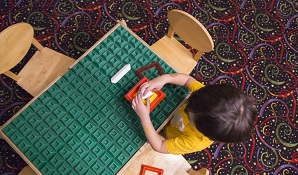With jobs being increasingly taken over by computers and even robots, how can you make sure that your child will have a rewarding, successful future?
To ensure their place in this rapidly changing automated world, your children will need to focus on the skills and abilities that those robots don’t have! Here’s how you can help your child to be an indispensable part of the human workforce in the decades to come.
Learn a language The ability to communicate comfortably and well in another language will continue to be a vital skill in the workplace of the future. As the global workplace becomes increasingly village-like, in years to come, those workers who can converse with their neighbours will have an employment advantage.
Mandarin is an obvious choice, as China’s global relevance continues to grow. Also valuable are Portuguese or French, which are widely spoken in Africa; Spanish, which is widespread in the Americas; and German and Italian, which are understood in many European nations. In South Africa, multilingualism in two or more of our official languages is a real advantage.
If your child’s school doesn’t offer the language they would like to learn, consider signing them up for courses at a language institute. If they are not learning for academic purposes, it’s always better to learn conversational rather than formal language. There are also great language apps and tools that your child can use to boost their skills.
Embrace diversity In this global village, our children will need to be tolerant of and sensitive to cultural differences. This open-minded and empathetic world view starts at home, so make a point of always being open to and considerate of other cultures, and of helping your children to understand them in an appropriate way. Teach them about other cultures, steering them away from stereotypes to true understanding.
Have a social and environmental conscience Businesses the world over are starting to embrace the concept of the triple bottom line – the notion that people and planet are just as important as profit. Your children will have to operate in a working environment that pursues these three ideals, so it helps if they have been made aware of the social and environmental consequences of their actions from a young age. Do community service with them – visit local children’s homes or collect litter in public spaces – and as they get older, continue to have conversations with them about their place in the world and their impact on it.
Learn to tell a good story Storytelling is becoming such an important skill in the workplace that business schools are now including it in their curricula for executive development. The idea is that anyone can churn out facts, but putting these facts together in a way that engages your audience is a skill – and one worth acquiring.
The best way to get good at storytelling is to consume stories – read books, watch movies, read articles and blog posts. Help your kids to be critical about what they see. Ask them what made that story a good one and point out the devices that have been used to create suspense, surprise or empathy. Encourage them to create their own stories and share them with you and reward them with your enthusiastic response. School drama or public speaking clubs are also a great way to get a handle on this skill. And there are many apps that children can use to create their own stories with supporting images and sound clips.
Be confident in an online world…We spend a lot of time telling our children to get off screens, but it’s also important that they develop online awareness and skills. Spend time with them online, using other tools, like search engines, video creation apps, coding games or knowledge resources to show them what skills they can gain in this space. Encourage them to learn and create online (not just WhatsApp their friends!) so that those skills come naturally to them when they are at university or in their first jobs.
...And in an offline world Your children will need to be proficient in an online world, but it is vital that they do not lose the ability to communicate in person. Keep them socialised by banning the phone some of the time, starting with supper time, when the focus should be on conversation around the dinner table. Drive home the importance of a phone call or a visit when communication really matters.
Be flexible The greatest survival skill your child could possess in the automated world of the future is the ability to adapt to change. Unfortunately, this is more of a personality trait than a skill that can be easily acquired, but as a parent you can do your best to prevent your child from becoming too dependent on routine. Sure they need structure, but you don’t have to schedule and control everything. Leave gaps for random adventures, make a point of encouraging spontaneity, don’t criticise when projects don’t work out, let them try things out, let them abandon them, and allow for things to unfold as learning experiences.
Know how to persevere Another leading skill that all children need is “grit” - to work hard, to see projects through to completion and to solve problems that present themselves along the way. Again this is a skill that comes naturally to some kids, but less so to others. Your role as a parent should be to nurture this kind of independence and determination. Resist the temptation to smooth your child’s path entirely, to take over their tasks and solve all their problems. Encourage them to work on their own and praise them for the process rather than the outcome.
Learn maths or science or computing (AND art or dance or drama) Of course, maths, science, coding and data skills will stand your child in good stead for dealing with the automation of the future. Even if these aren’t their favourite subjects at school, you can encourage them to play maths games or to work with puzzle-solving apps to give that part of their brain a workout.
But it is also vitally important to nurture the creative right brain. Businesses today are looking to employ arts graduates into professional roles because of the creativity and insight they bring to working situations. From an early age, provide your child with the materials that they need to create, and encourage messy play. As they grow older, send them for art, music or drama lessons, and celebrate their progress and achievements in these areas as much as you would the A+ in maths or science.
Embrace lifelong learning
Your children won’t be able to just get a degree and then be set up for life.
Your children won’t be able to just get a degree and then be set up for life. They will have to keep learning throughout their lives or the pace of change will leave them behind. Teach them the joy of learning by exploring with them and discovering the world and all the knowledge it contains.
As they grow older, encourage them to read, research, solve, discover and create on their own – and give them access to all the channels they need to do this. Help them understand how to use the internet for research, buy them subscriptions and books in their areas of interest, and support extra-curricular activities that teach them new things.
Brace yourself for the future While many of the ways in which our children learn or the concepts they encounter are new, the skills that they need to succeed in future are not so very different from those they needed in the past. If you focus on maintaining a balance between social and work, online and offline, and academia and creativity, your children should emerge with at least some of the skills they need to keep the robots at bay.




